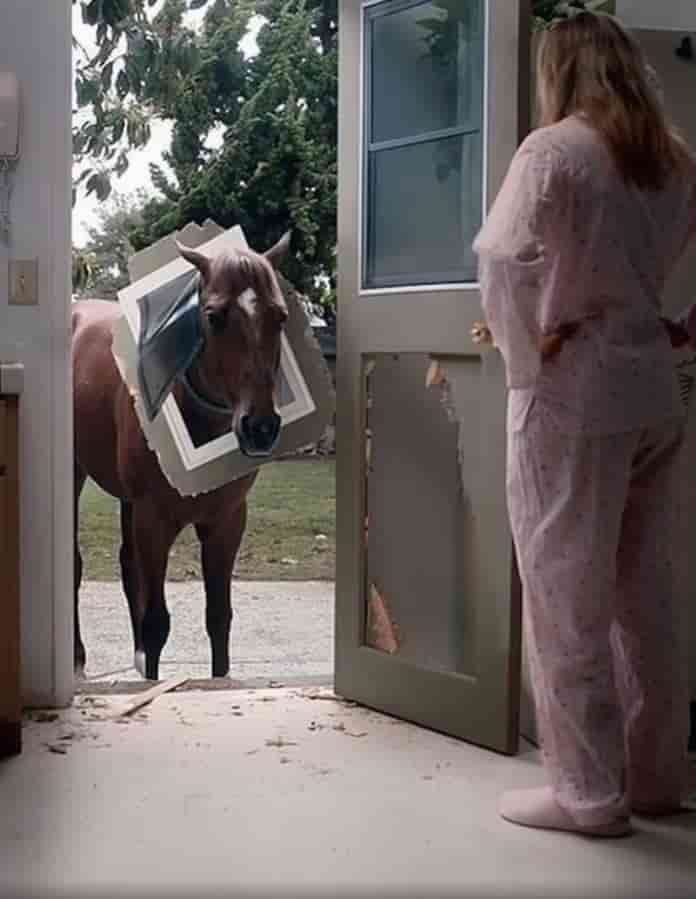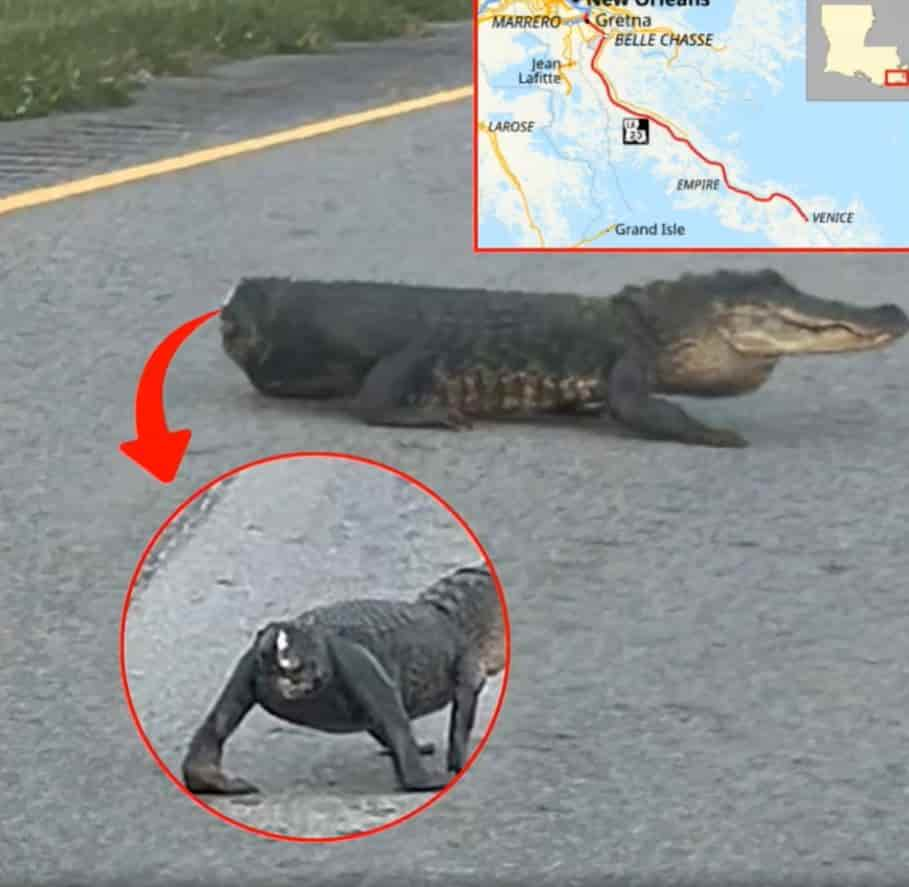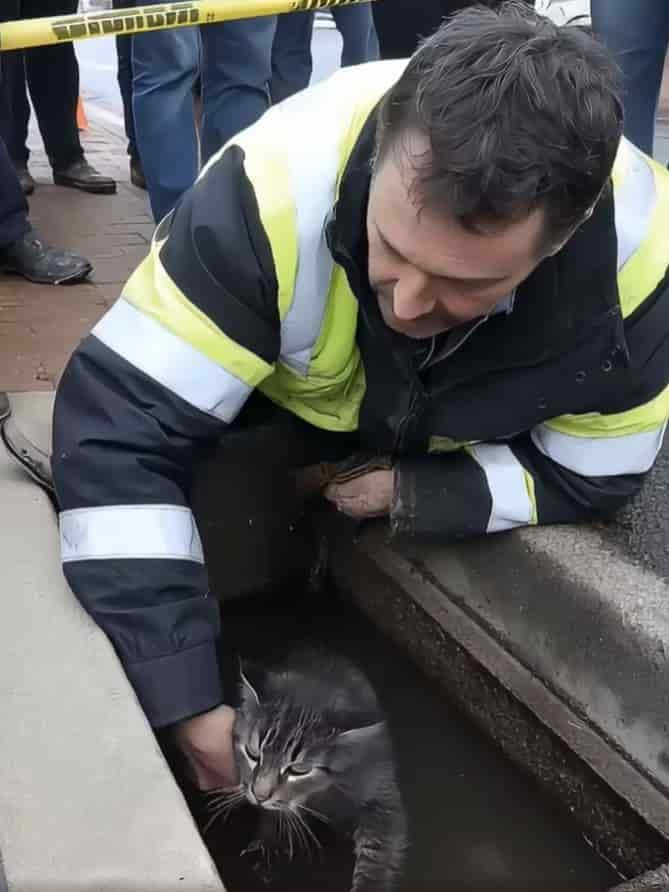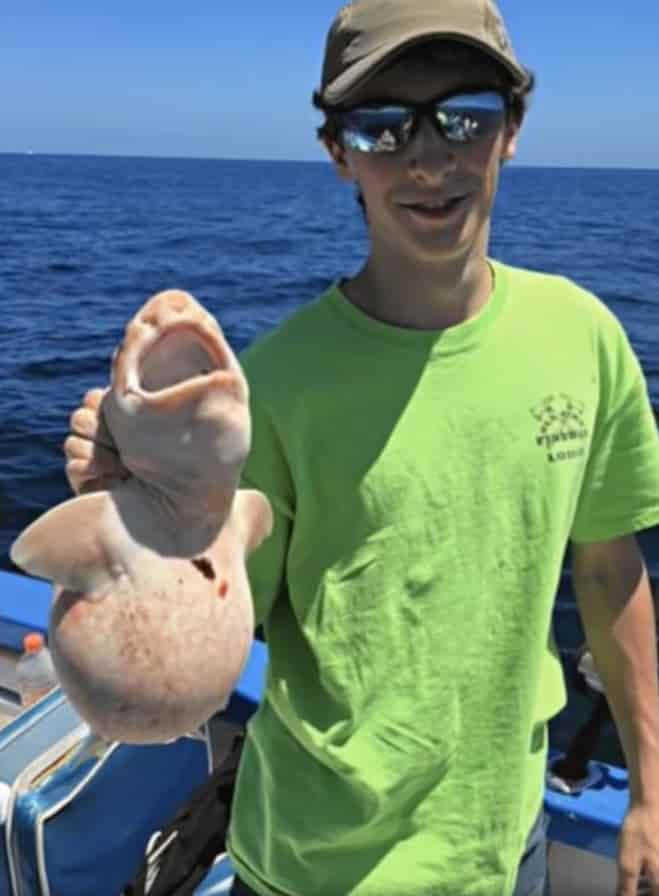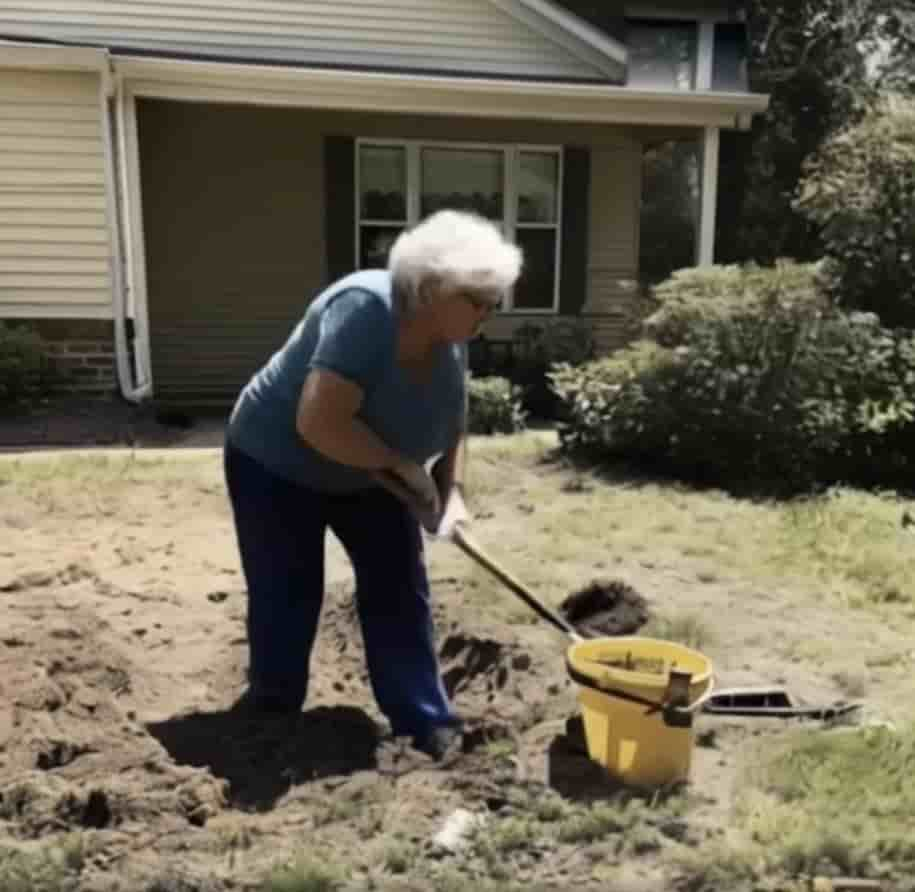
At just 19 years old, Anna never imagined her life would take such a dramatic turn. Born into a modest Ukrainian family who once ran a thriving vineyard, she had grown up surrounded by laughter, grapevines, and the scent of aging oak barrels. But when her father’s business fell into severe debt, everything crumbled.
The bank threatened to seize their land, the workers left one by one, and foreclosure loomed. Her father, a proud man, was devastated. In desperation, he accepted what seemed like the only solution — a wealthy Arab sheikh, aged 75, offered to marry Anna in exchange for clearing the family’s debts and saving their home.
At first, Anna was horrified. Marry a man older than her grandfather? It felt wrong. But then came the persuasion: “It’s just a formality,” her parents said. “He’s kind, he only wants companionship, and you’ll be well taken care of. There won’t be any intimacy.” The weight of responsibility pressed on her. Could she really let her family lose everything?
With a heavy heart and a numb sense of duty, Anna agreed.
The wedding was held in Morocco — lavish, opulent, and surreal. Anna wore an ornate dress embroidered with gold thread, her hair braided with jasmine. Guests applauded, musicians played exotic melodies, and she smiled for photos she would rather forget.
As the night fell, dread began to creep in. She kept reminding herself: This is just for show. Nothing will happen.
But once the doors to the private chamber closed, everything changed.
The sheikh, though physically frail, made it clear he expected a traditional wedding night. Anna froze. Panic surged through her. She had been promised safety, but now, she realized, promises meant nothing in this world of wealth and power.
She cried, begged him to wait. He watched her silently for a long moment. Then, to her surprise, he said nothing. He lay down on the bed and fell asleep.
That night, Anna didn’t sleep. She sat by the window, trembling and confused. In the early hours of the morning, she heard a strange noise — a gasp. She rushed to the bed and found him unconscious. His breathing was shallow, his skin pale. She called for help, but it was too late. The sheikh had suffered a heart attack and died before sunrise.
The palace erupted into chaos. Doctors, guards, lawyers, relatives — all arrived within hours. Anna was in shock. But the real storm came later.
It turned out that shortly before his death, the sheikh had changed his will. Anna, his new legal wife, was to inherit a large portion of his fortune — including the Moroccan estate and several international assets.
His family was outraged. They accused her of manipulation. Of being a gold-digger. Of hastening his death.
Lawsuits followed. The media picked up the story. Headlines read: “Teen Bride Inherits Sheikh’s Empire.” Strangers painted her as a seductress. A criminal. A villain. But none of them knew what had really happened that night — that she had been terrified, alone, and never even touched him.
Years passed.
The legal battles dragged on, but eventually, the courts ruled in Anna’s favor. The marriage had been valid. The will, though sudden, was signed under no proven duress. She retained the inheritance.
But the fortune did not bring her happiness.
Anna used much of the money to rebuild her family’s vineyard. She turned the estate in Morocco into a sanctuary for women escaping forced marriages. And she kept mostly out of the public eye, rarely giving interviews or speaking about what had happened.
Only once did she address the rumors. In a quiet blog post, she wrote:
“I didn’t ask for this life. I didn’t ask for the money, the pain, the judgment. I was a girl trying to protect her family. That wedding night, I was scared. And when he died, I felt nothing but confusion and guilt. Not every woman who ends up with a rich man is a liar or a villain. Sometimes, she’s just a daughter trying to save what little she has left.”
Anna’s story remains a strange blend of tragedy, survival, and fate. While some still judge her, others admire her strength — not for marrying a sheikh, but for rising above what came after.
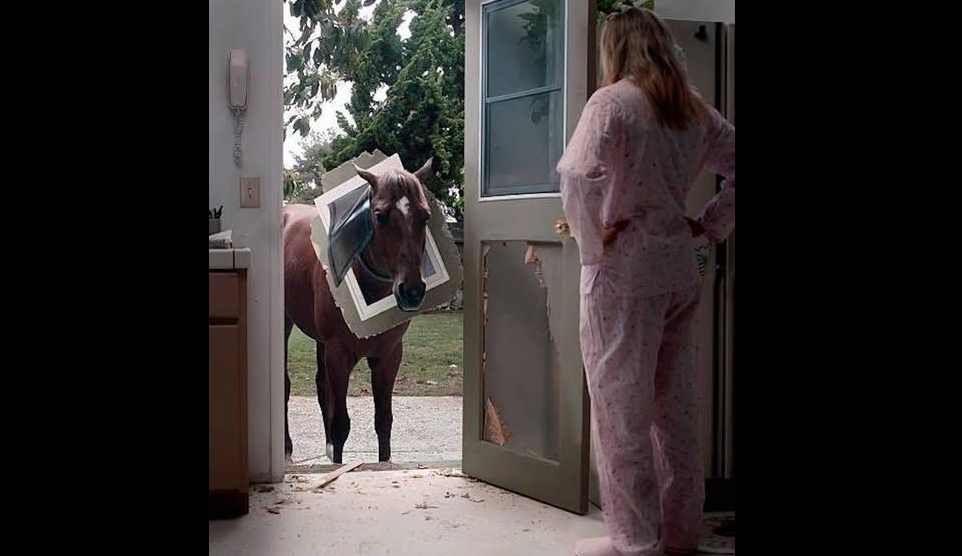
I’m not even fully awake yet, and I still don’t know how it happened. One second I’m lying in bed, thinking it’s just another Thursday morning, and the next I hear this weird dragging noise outside—like metal scraping wood. I figured maybe the garbage bins tipped over again or something.
But when I stepped into the kitchen, I froze. The bottom half of our back door was gone. Not opened. Gone. Smashed inward, with splintered wood everywhere and the latch half-hanging by a screw. And right there, standing in the middle of the patio like he owned the place, was Oscar—our horse. Yeah. Horse.
We’ve got a small plot of land, nothing fancy, and Oscar’s usually in the little paddock out back. He’s calm, older, not the kind to act out unless something’s seriously wrong. But there he was, chest heaving, covered in dirt and sweat. And around his neck—I’m not joking—was the bottom part of the door, still looped like a messed-up collar, as if he’d crashed straight through and just kept going.
I didn’t know what to do first. I checked for blood. None. Thank God. But his eyes were wide, like he’d seen something. Like he was still running from it. And the weirdest part? The latch to his paddock was still locked.
I haven’t even told Sam yet. He’s still at work. And the neighbors already think we’re barely holding it together out here. I just stood there, barefoot in the kitchen, staring at Oscar with a piece of our door hanging off his neck like some kind of warning.
And then I noticed something way out near the tree line— a bit of movement. Subtle, like someone ducking. My heart kicked up. We don’t get a lot of foot traffic out here. The nearest neighbor is half a mile up the road, and there’s no reason for anyone to be in our woods unless they’re hunting illegally… or hiding.
I slid open the drawer by the fridge, grabbed the flashlight, and walked slowly onto the patio. Oscar didn’t even flinch. He just stood there like he’d done his job. And that’s when it hit me—he had done something on purpose. He wasn’t trying to escape. He was trying to get to me.
I whispered, “What were you trying to tell me, old man?” and gave him a pat, then turned toward the tree line. I wasn’t planning to go into the woods alone, not without calling Sam or the sheriff first. But curiosity can be louder than fear sometimes. I stayed at the edge of the yard, scanned the trees with the flashlight, and finally spotted it.
A little backpack. Just barely sticking out from behind a fallen log. And next to it, a kid. A kid. She looked about nine or ten, messy hair, dirt on her face, knees tucked up to her chest. When the light landed on her, she didn’t flinch or run. She just stared back.
I called out, “Hey, sweetie… are you okay?” She hesitated, then slowly stood. Still didn’t say anything.
I walked a little closer, keeping my voice calm. “Did you get lost out here?” Finally, she nodded. Then shook her head. Then said, “I wasn’t lost. I ran away.”
Turns out her name was Kendra. She’d wandered over from the trailer park about two miles through the woods. Said she left after another fight between her mom and her mom’s boyfriend. Oscar must’ve sensed her out there, scared and alone. He’d never acted like that before, but maybe animals know more than we give them credit for.
I brought her inside, gave her water and a peanut butter sandwich while I called the sheriff. Nothing aggressive—just wanted someone official to help figure things out. They recognized her name right away. Said this wasn’t the first time she’d wandered off.
The sheriff came quick. She didn’t want to go at first, clung to my arm and asked if she could just stay with Oscar. But eventually she left, and I made sure to get the social worker’s number.
Later that day, Sam came home and stared at the busted door, then at Oscar, then at me. I just said, “You wouldn’t believe me if I told you.”
We replaced the door the next day. Cost us more than we had budgeted, but it didn’t even matter. Because something shifted for me after all that. I’ve been so focused on everything that’s not working in our life—money stress, repairs piling up, Sam working long hours, me still trying to get my small business off the ground. But that morning reminded me that sometimes, we’re exactly where we’re meant to be. That maybe even when we feel like we’re barely holding it together… we’re doing more good than we know.
Oscar’s still out back, snacking on apples and acting like none of this ever happened. But I see him differently now. Like he’s more than a pet. Like he’s family.
And if that little girl ever knocks on our door again, I’ll make sure she knows she’s got a safe place to land. Sometimes, life gives you chaos to reveal a purpose. And sometimes, your horse crashes through the kitchen door just to remind you of that.
If this story touched you, give it a like or share. You never know who might need a reminder that kindness still exists—sometimes in the most unexpected ways.

The river was deceptively calm that morning, its surface a mirror reflecting the vibrant hues of the autumn foliage surrounding it. The gentle lapping of water against the boat’s hull was soothing, a stark contrast to the chaos that would soon unfold. The crew, a tight-knit group of adventurers and nature enthusiasts, had embarked on this journey with the spirit of discovery in their hearts. They had navigated these waters dozens of times, but today, the river had different plans.
As they paddled further down the winding river, the tranquility was shattered by an ominous rumble. The boat began to shudder, an eerie vibration that resonated through every plank of wood and every soul on board. It was as if the river itself had awakened, stretching its watery tendrils to ensnare them.
Suddenly, without warning, the boat was seized by an unseen force. It lurched violently, jerking the crew from their seats and sending paddles skittering across the deck. The river had found its prey, dragging the vessel inexorably towards the heart of the whirlpool that lay hidden beneath the surface.
Panic erupted among the crew. Shouts filled the air, mingling with the roar of rushing water. The captain, a seasoned navigator with a weathered face etched with years of river lore, barked orders in a desperate bid to regain control. But it was too late. The whirlpool had them in its grip, and it was not inclined to let go.
As the boat spun towards the vortex, time seemed to dilate. Seconds stretched into minutes, the world narrowing to the chaotic dance of water and wood. The crew clung to anything within reach, knuckles white with the effort of holding on. Their minds raced with thoughts of survival, their senses heightened by the impending disaster.
The whirlpool was a force of nature, a swirling maelstrom fueled by ancient currents and the whims of the earth. It was both beautiful and terrifying, a reminder of the river’s absolute power. The boat’s hull creaked and groaned under the strain, the timbers protesting against the relentless pull.
Just as hope began to wane, a moment of clarity broke through the chaos. The captain, eyes fixed on the churning water, spotted a potential escape. Near the edge of the whirlpool, a narrow channel of calm water beckoned, a slim chance for salvation. With renewed determination, he shouted new orders, rallying his crew to action.
Together, they fought against the whirlpool’s grip, paddling with all their might. The boat strained against the current, inching its way toward the slender path to freedom. The river resisted, but the crew’s resolve was unyielding.
Finally, with a final, Herculean effort, the boat broke free from the vortex’s clutches. It shot forward into the calm channel, the whirlpool’s fury fading behind them. Exhausted but triumphant, the crew let out a collective breath, hearts pounding in their chests.
They had danced with disaster and emerged intact, bonded by their ordeal and the river’s lesson. As they drifted toward the riverbank, the sun broke through the clouds, casting a golden glow over the water. It was a new day, a second chance gifted by the river that had almost claimed them.
In the quiet aftermath, they knew the river would always hold its secrets, and they would return to explore them, forever respectful of its unpredictable nature.

A woman in Louisiana captured a video of an alligator without a tail crossing a road in the state
The woman, Ashley Bartholomew, shared with a local outlet that at first she thought the creature might be a dog
A reptile expert theorized that the alligator could have gotten in a fight with another gator and lost its tail
One Louisiana woman had quite the tale to tell after encountering a unique tailless alligator on May 19.
Ashlyn Bartholomew posted a now-viral photo to Facebook of an alligator with a missing tail crossing Highway 23 in Plaquemines Parish, La. As of May 28, the post has received thousands of interactions.
In a clip of the reptile shared by Bartholomew, the slow-moving gator makes its way across the highway, awkwardly waddling as it navigates without its tail.

“I couldn’t tell at first if he was an alligator or a big dog or what,” Bartholomew told local outlet Nola.com. “This was the first time I ever saw an alligator without a tail.”
Bartholomew first noticed the alligator lying down in the road, “minding his own business,” after dropping her sons off at baseball practice.
In response, she recorded the reptile and posted images of the creature on Facebook with the caption, “Y’all be careful. There’s half an alligator walking on the road.”
And while there’s no telling what caused the gator to sport a stump where its tail should be, reptile expert Robert Mendyk from the Audubon Zoo has a few theories.
Mendyk told Nola.com that the alligator’s tail could have been lost due to a run-in with a boat propeller or, most likely, a rival gator.
Mendyk added that alligators regularly survive such amputations. “The wound walls itself off and heals,” he said. “They have really phenomenal healing and regenerative abilities.”
He also noted that if the alligator was attacked, it was likely attacked by a male alligator with the “bite force” to chomp off a tail.
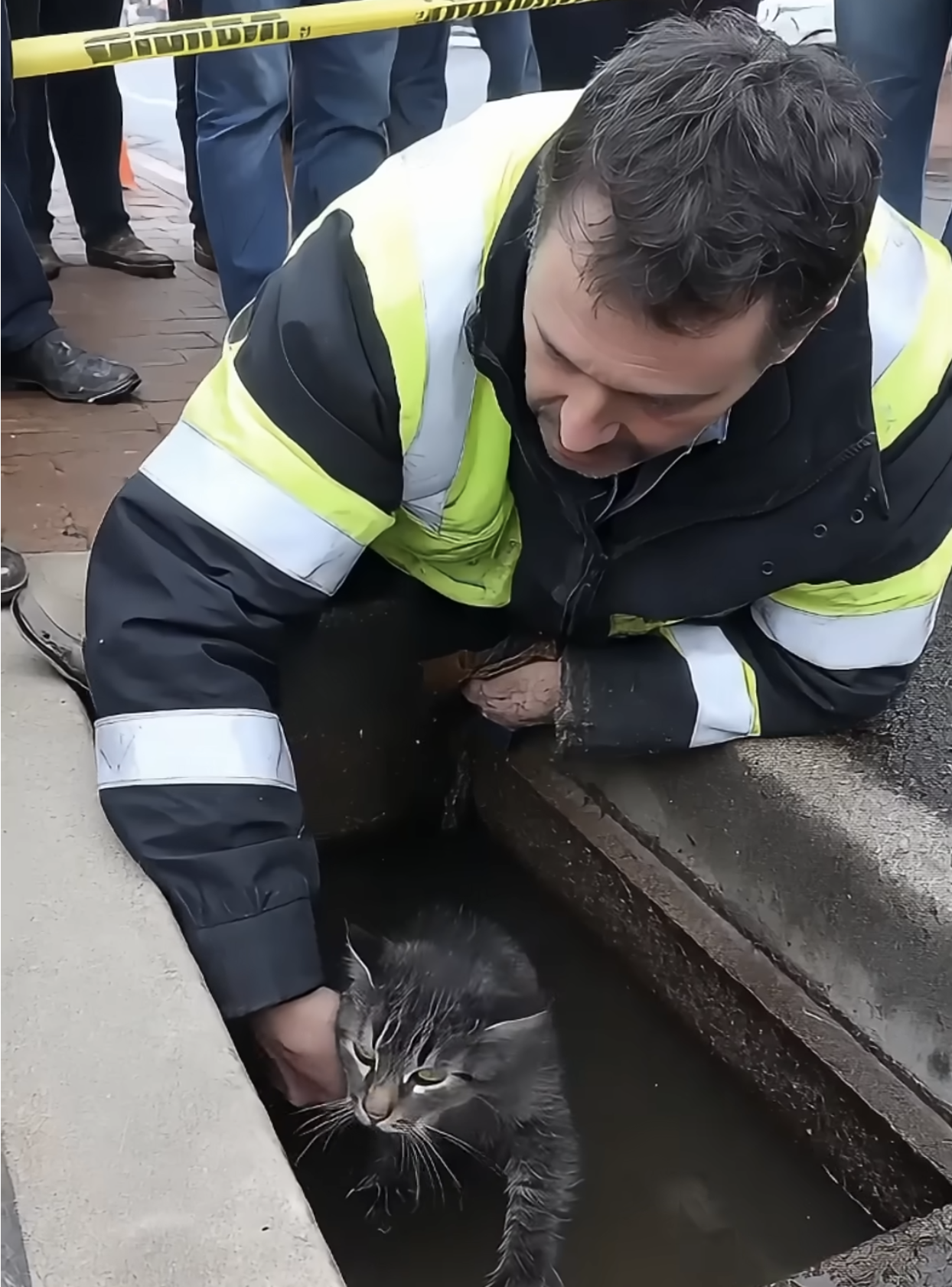
In the small, tight-knit community of Maplewood, where everyone knows each other by name, a peculiar incident unfolded one bright Saturday morning that would leave the entire town buzzing with disbelief and astonishment.
It all began with a faint, desperate meowing that echoed through the quiet streets. Mrs. Thompson, an early riser and a keen gardener, was the first to hear it as she tended to her rose bushes. The sound was unmistakable—it was a cat in distress. Concerned, she followed the cries, which led her to a storm drain at the end of her street.
Peering through the grill, Mrs. Thompson spotted a small, frightened tabby cat, its eyes wide and pleading. Without hesitation, she called for help. Within minutes, a small crowd had gathered, each person peering into the murky depths and exchanging worried glances. Among them were Mr. Johnson, the local handyman; Sarah, a high school student known for her love of animals; and the ever-curious young twins, Jake and Julie.
Realizing the severity of the situation, Mr. Johnson took charge. “We need to get this little one out of there,” he declared, rolling up his sleeves. He fetched his toolbox from his truck, while Sarah, with her phone in hand, called the local animal shelter for advice. Meanwhile, Jake and Julie, determined to help, began crafting a makeshift ladder out of sticks and twine.
The atmosphere was tense yet hopeful as the community pooled their efforts. Mr. Johnson worked diligently, unscrewing the drain cover, while Mrs. Thompson kept the cat calm with soothing words. The tabby, sensing the help on the way, seemed to quieten down, its eyes fixed on its rescuers.
Just as Mr. Johnson lifted the heavy cover aside, a low rumbling sound caught everyone off guard. The ground trembled slightly, and to everyone’s surprise, a section of the road beside the drain began to sink, revealing a large subterranean cavern.
Gasps of shock and awe rippled through the crowd as they peered into the unexpected discovery. The cavern was spacious, with walls glistening from moisture and a small underground stream running through it. But what caught everyone’s attention was the flicker of something shiny among the rocks—coins, jewelry, and what appeared to be old artifacts scattered about.
The cat, now free from the drain, emerged cautiously and, with an air of nonchalance, trotted towards Sarah, who scooped it up with relief. The initial mission accomplished, the focus shifted to the newfound treasure trove beneath their feet.
As news of the discovery spread, more townsfolk arrived, each person eager to catch a glimpse of the mysterious underground chamber. Experts were called in, and soon it was confirmed that the cavern was an ancient hiding place, possibly dating back centuries.
The little tabby, once trapped and helpless, had inadvertently led the community to a historical treasure that would soon put Maplewood on the map. The town, which had always prided itself on its camaraderie, now had a story that would be told for generations—a tale of unity, surprise, and the unlikely heroism of a small, determined cat.
In the days that followed, the cat, affectionately named “Lucky,” became a beloved mascot of Maplewood. And as for the treasure, it was carefully excavated and displayed in the town’s museum, a testament to the extraordinary events that unfolded on that memorable Saturday morning.
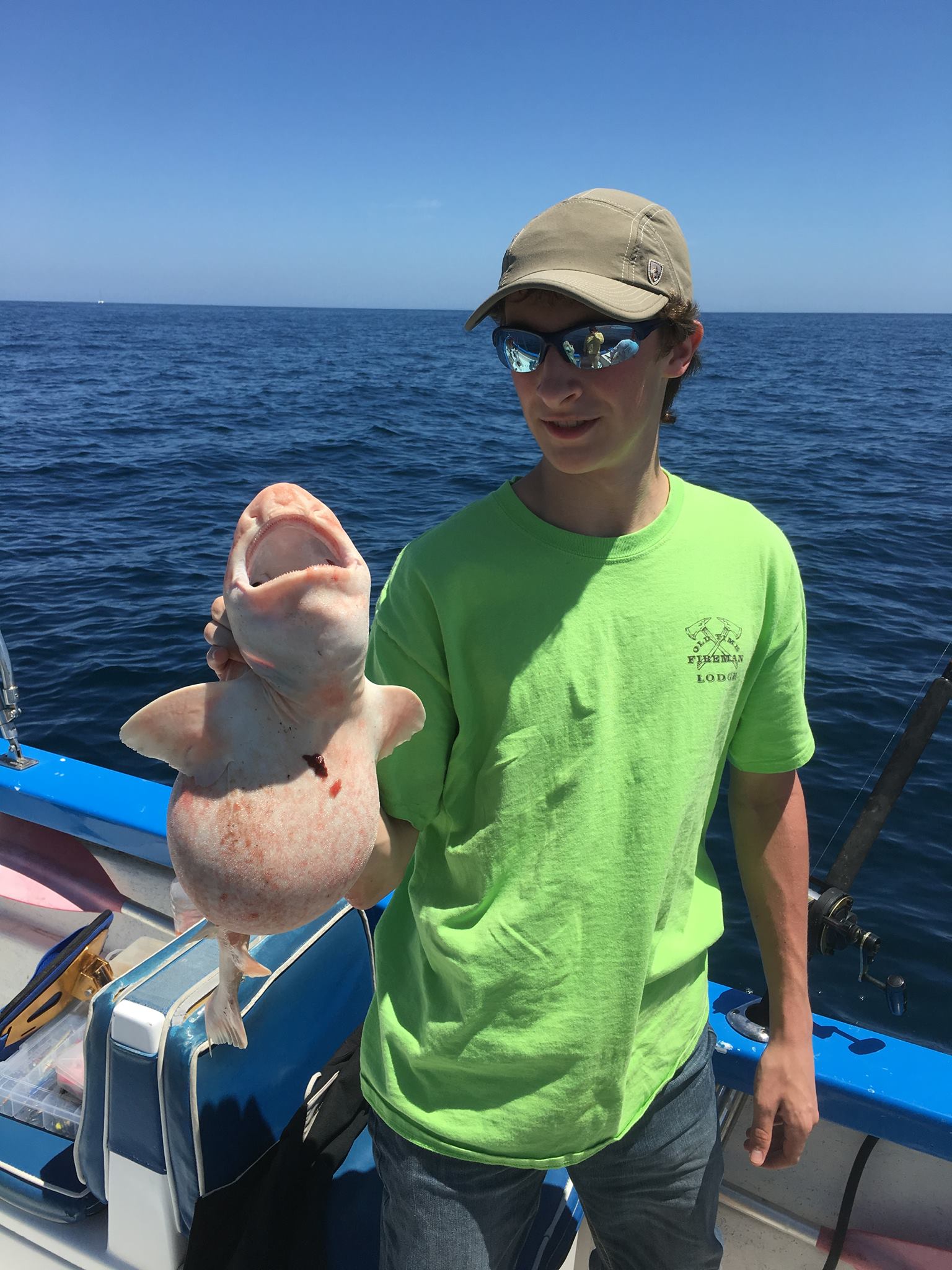
In an extraordinary turn of events, marine biologists have successfully identified a mysterious aquatic creature that had puzzled both scientists and the public alike. The unusual fish, initially dubbed the “alien fish” due to its bizarre appearance and unique coloration, was ultimately identified as an albino swell shark. This remarkable discovery not only solved the mystery surrounding the enigmatic creature but also offered fascinating insights into the diversity and adaptability of marine life.
The story began when Jaime, an avid scuba diver and underwater photographer, encountered the strange fish while exploring the depths of a secluded coral reef. Captivated by its ghostly white skin and bulbous body, Jaime quickly snapped several photographs of the creature before gently releasing it back into the ocean. Upon returning to shore, Jaime shared these images with both local scientists and social media, sparking widespread curiosity and speculation about the nature of the peculiar fish.
The photos rapidly caught the attention of marine biologists around the world, leading to a collaborative effort to identify the creature. After extensive analysis, experts concluded that the fish was indeed an albino swell shark. Swell sharks, often found along the eastern Pacific Ocean, are known for their unique ability to inflate their bodies as a defense mechanism against predators. This new discovery of an albino variant added another layer of intrigue to the species.
Albino animals lack the pigmentation that gives color to their skin, scales, or fur, resulting in a distinctive white appearance. This rare genetic condition, known as albinism, can occur in almost any species, but it is particularly uncommon in marine environments where pigmentation often plays a crucial role in survival and camouflage. The identification of an albino swell shark is therefore a significant finding, as it underscores the incredible adaptability and resilience of oceanic life.
The resolution of the alien fish mystery has been met with excitement and enthusiasm from both the scientific community and the general public. Researchers are eager to learn more about the implications of albinism in swell sharks and how such genetic variations might affect their behavior, habitat, and interactions with other marine creatures. Understanding these dynamics could provide valuable insights into the evolutionary processes that shape biodiversity in the ocean.
Moreover, the story of the albino swell shark serves as a reminder of the wonders that still await discovery beneath the waves. Despite the vastness of Earth’s oceans, only a fraction of marine species have been studied in detail, leaving countless mysteries to be unraveled by future generations of scientists and explorers. This finding highlights the importance of preserving marine habitats and supporting research efforts to uncover the secrets of the deep.
Thanks to Jaime’s keen eye and passion for marine exploration, the world has been introduced to a remarkable creature that might have otherwise gone unnoticed. Jaime’s decision to release the albino swell shark back into its natural habitat reflects a deep respect for marine life and a commitment to conservation. As researchers continue to study the photos and gather more information about this unique shark, they are optimistic about the potential discoveries that lie ahead.
In conclusion, the resolution of the alien fish mystery not only provided clarity on the identity of the peculiar creature but also inspired a renewed appreciation for the incredible diversity of life in our oceans. The albino swell shark stands as a testament to the mysteries that remain hidden beneath the surface, waiting to be discovered by those with the curiosity and courage to seek them out.
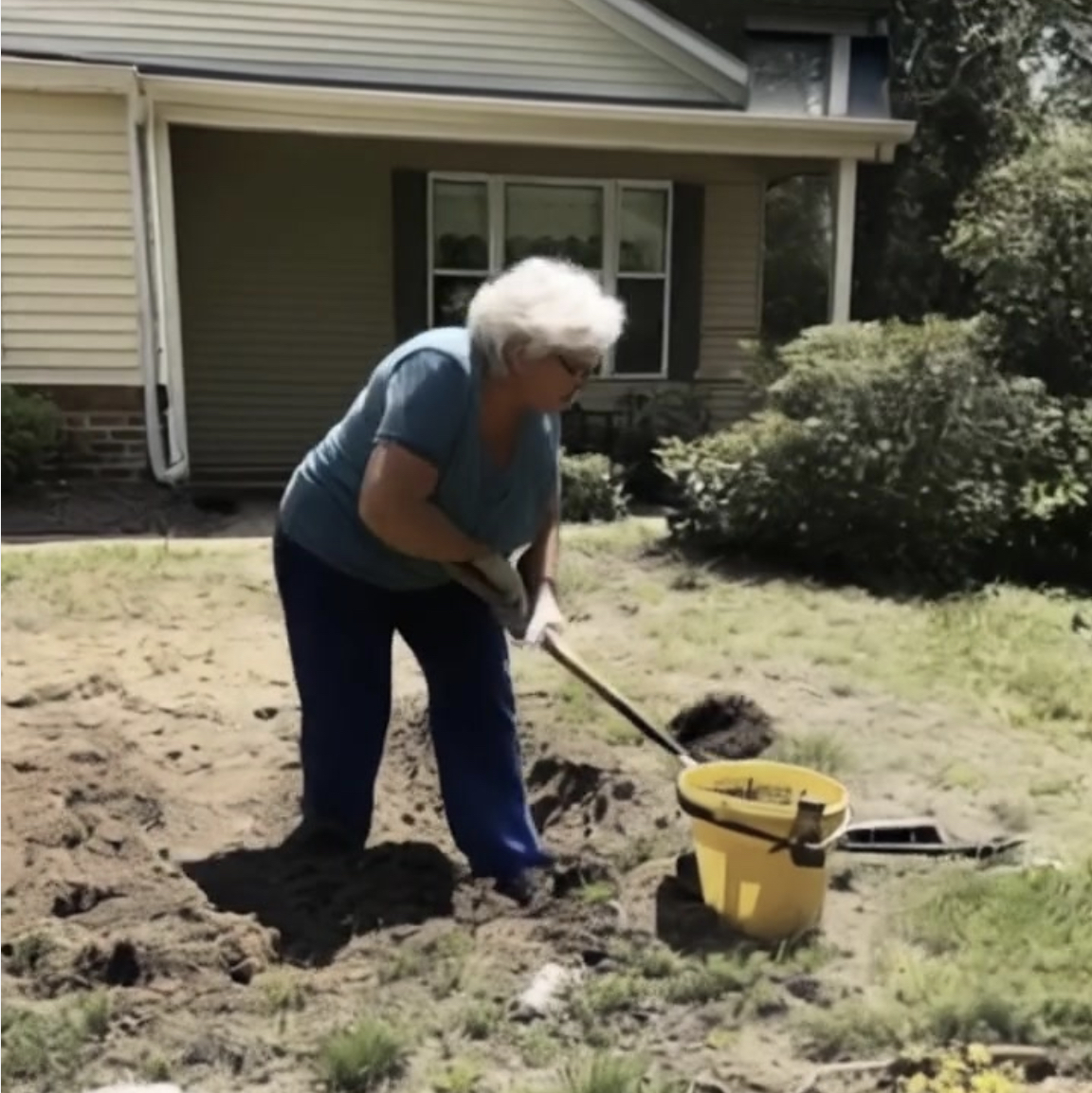
It was a sunny Saturday morning, and I was tidying up around the house, relishing the calm that the weekend often brought. The birds were singing their familiar chorus, and the neighborhood was lazily waking up to the promising day. As I moved from room to room, dusting and rearranging, I caught sight of my neighbor, Mrs. Thompson, through the window. Her straw hat bobbed up and down as she worked diligently in her garden, a sight as familiar as the sun rising in the east.
Mrs. Thompson, a widow in her late sixties, was known for her love of gardening. Her yard was her sanctuary, brimming with an assortment of flowers and plants that she tended with the devotion of a mother to her children. But today, something seemed different. She was focused on a particular spot near the old oak tree, digging with an intensity that was unusual even for her.
I shrugged it off at first, attributing her fervor to perhaps a new garden project. But as I continued with my chores, I couldn’t shake the feeling that something was amiss. I peered out the window again, just in time to see her pause, her hand clutching her chest. She swayed on her feet, and before I could fully process what was happening, she collapsed onto the soft earth.
Panic surged through me like a bolt of lightning. I dropped what I was doing and rushed outside, jumping over the low fence that separated our yards. As I neared the spot where she lay motionless, horror mixed with confusion gripped me. There, in the freshly dug hole, something glinted in the sunlight.
I knelt beside Mrs. Thompson, feeling for a pulse and relieved to find it, albeit weak and thready. My hands shook as I dialed 911, my eyes flicking back to the mysterious object partially buried in the dirt. It was metallic, old-looking, and definitely not something one would expect to find in a suburban garden.
With the emergency services on their way, I had a moment to satisfy my growing curiosity. I reached into the hole, brushing the soil away carefully. My fingers traced the outline of what appeared to be a small chest, its surface marred by time and the elements. I sat back on my heels, my mind racing with possibilities. Was this a buried treasure? A time capsule?
The wail of sirens pulled me from my reverie, and I refocused on Mrs. Thompson. The paramedics arrived and took over, efficiently loading her onto a stretcher while I relayed what had happened. As they carried her away, I promised to keep an eye on her house, my thoughts still lingering on the enigmatic chest.
Once the ambulance had disappeared down the street, I returned to the mysterious hole. Gently, I lifted the chest out, its weight surprising for its size. I wiped away more dirt to reveal an intricate design etched into the metal, hinting at a history I couldn’t begin to guess.
As I sat there, the chest resting heavily in my lap, I pondered what to do next. Should I open it? Share the discovery with Mrs. Thompson once she was well again? I decided to wait, respecting the privacy of someone who had always been more than just a neighbor to me.
Days later, as Mrs. Thompson recovered in the hospital, I visited her, recounting the events and showing her the chest. Her eyes widened with recognition, tears spilling onto her cheeks. “It’s a family heirloom,” she whispered, her voice thick with emotion. “I thought it was lost forever.”
In that moment, I realized that the true treasure was not what was inside, but the stories and history the chest represented—a tangible connection to the past that had found its way back home.

On a crisp autumn morning, the sun was barely peeking through the horizon as passengers boarded the train at Milton Junction. The train, a sleek modern marvel of engineering, promised a peaceful journey across picturesque landscapes, from lush green fields to charming hamlets nestled in the valley. For many, this was a routine commute, while for others, it was the beginning of an eagerly anticipated adventure. With steaming cups of coffee in hand and newspapers folded under arms, passengers settled into their seats, unaware that their peaceful ride would soon veer into tragedy.
The train glided smoothly along the tracks, a testament to precision and efficiency. Conversations hummed softly, punctuated by the gentle clatter of wheels on rails. Laptops clicked open, and the rhythmic sway of the carriage lulled a few passengers into early-morning naps. The world outside blurred into a tapestry of colors—a serene backdrop for the day ahead.
However, as the train approached the narrow corridor between the Pinewood Hills, the tranquility shattered in an instant. A spine-chilling screech reverberated through the carriages, and the train lurched violently. Panic ensued as passengers were thrown from their seats, belongings cascading through the air. The once orderly aisles became chaotic as the train careened off its tracks, culminating in a cacophonous crash.
Emergency responders arrived swiftly, their sirens wailing against the backdrop of chaos. The scene was heart-wrenching—carriages lay mangled, smoke billowing into the sky. Survivors staggered away, dazed and injured, while others were trapped within the twisted metal, awaiting rescue.
In the aftermath, investigators worked tirelessly to unravel the cause of the derailment. Preliminary reports suggested a malfunction in the automated signaling system. The train, traveling at a high speed, had received incorrect data, directing it onto a maintenance track where unfinished repairs had left the rails unstable.
Further investigation revealed an unsettling oversight—scheduled system updates had been delayed due to budget constraints. The aging infrastructure, once a hallmark of safety, had become a ticking time bomb. The combination of outdated technology and human error had turned a peaceful ride into a nightmare.
As the investigation continued, the tragedy sparked a wave of public outcry. Families mourned the loss of loved ones, while survivors grappled with the trauma of the event. Communities rallied together, offering support and demanding accountability. The incident became a catalyst for change, highlighting the urgent need for investment in infrastructure and safety protocols.
In the wake of the derailment, transportation authorities pledged to overhaul the system. New safety regulations were implemented, and funds were allocated for comprehensive upgrades to prevent such tragedies in the future. The tragedy served as a somber reminder of the delicate balance between progress and safety, urging society to prioritize the latter without compromise.
As the sun set on that fateful day, casting a golden hue over the landscape, the community took a moment to remember the lives lost. Candles flickered at impromptu memorials, casting soft light on tear-streaked faces. In their hearts, there lay a resolve to honor the memory of those who perished by ensuring that such a tragedy would never repeat. The peaceful ride that turned into a nightmare became a poignant chapter in the story of resilience and renewal, etching its lessons into the annals of history.

Seconds after the ground shook, chaos erupted in front of thousands of spectators gathered at the annual city fair. The day had begun with joyous laughter, the aroma of funnel cakes wafting through the air, and the vibrant colors of carnival rides spinning lazily against a clear blue sky. Families and friends meandered through stalls, their faces painted with wide smiles as they embraced the festive spirit.
The initial tremor was subtle, a gentle ripple beneath their feet that could have easily been mistaken for the rumble of a distant train. But within seconds, the earth groaned with a more menacing intensity. The laughter that had filled the air turned to gasps and cries of alarm. Ferris wheels creaked ominously, and midway games clattered to the ground, spilling their prizes as the earth continued to convulse.
Panic spread like wildfire through the crowd. People clutched their loved ones, eyes wide with fear as they sought an explanation for the sudden upheaval. Vendors abandoned their stalls, their once-cheerful shouts of persuasion replaced by urgent cries to evacuate. The ground beneath them shifted again, more violently this time, sending those unsteady on their feet tumbling to the ground.
In the chaos, a young mother clutched her toddler tightly, her heart pounding in her chest as she scanned the crowd for her husband. Beside her, an elderly gentleman stumbled, his cane clattering away from him as he fell. Instinctively, she reached out, helping him to his feet even as her own legs trembled with fear. Around them, others paused in their flight to assist those who had fallen or were trapped, a flicker of humanity amid the turmoil.
Nearby, the carnival rides stood as silent sentinels, their once-merry tunes now eerily absent. The towering Ferris wheel swayed precariously, its brightly colored gondolas swinging like pendulums against the backdrop of an unsettled sky. A group of teenagers, stranded at the top, clung to each other, their shouts for help piercing the din of chaos below.
Emergency workers quickly mobilized, their training kicking in as they moved through the throngs of people, issuing commands and guiding the panicked masses to safety. Sirens wailed in the distance, a reassuring yet ominous reminder that help was on its way. The ground, though still trembling intermittently, began to settle, teasing a reluctant calm back into the air.
As the dust began to settle, the true magnitude of the disruption became apparent. The fairground, once a hub of laughter and light, lay in disarray. Tents were toppled, ride structures were askew, and the debris of a hastily abandoned celebration lay strewn across the ground. Yet, amid the wreckage, a resolute spirit emerged. Strangers became allies, lending hands to the injured, offering solace to the frightened, and sharing whatever provisions they could salvage.
In the aftermath of chaos, the bonds of community strengthened. People who had been mere faces in a crowd just moments before now shared a collective experience that transcended the boundaries of acquaintance. As the sun dipped below the horizon, casting long shadows over the battered fairground, the echoes of fear were gradually replaced by murmurs of gratitude and resilience. They had weathered the quake together, and together they would begin the arduous process of rebuilding, stronger and more united than before.

In a rare show of bipartisan unity, the U.S. Senate has passed the “No Tax on Tips Act” — a bill introduced by Texas Senator Ted Cruz — aimed at providing long-overdue financial relief to millions of service industry workers.
The legislation, which passed unanimously, would make tips exempt from federal income tax, directly benefiting workers like waiters, bartenders, delivery drivers, and hotel staff — those who rely on gratuities to make ends meet.
A Boost for the Working Class
Senator Cruz hailed the bill as a major win for working Americans.
“This legislation will have a lasting impact on millions of Americans by protecting the hard-earned dollars of blue-collar workers,” Cruz said. “These are the very people who are living paycheck-to-paycheck.”
He emphasized that tipped workers often face inconsistent income and long hours, and that removing federal taxes on tips would help them keep more of what they earn.
For Cruz, the bill is not just about tax policy — it’s about fairness.
Bipartisan Support: A Rare Political Moment
Joining Cruz in co-sponsoring the legislation was Democratic Senator Jacky Rosen of Nevada, whose state has a large hospitality industry that depends on tipping.
The bipartisan backing of the bill helped it sail through the Senate without opposition — a rare outcome in today’s often divided Congress.
Senator Rosen noted that for many in her state, tips aren’t a luxury — they are a necessity.
“Service workers form the backbone of our tourism economy,” Rosen said. “This bill gives them the respect and support they deserve.”
How the Bill Works
The No Tax on Tips Act would amend the Internal Revenue Code to exclude tip income from federal income taxation.
Currently, tipped employees are required to report tips as income, and employers must withhold payroll and income taxes accordingly. This process adds complexity for both workers and small businesses — especially restaurants and hospitality employers.
Under the proposed law:
- Workers would still report their tip earnings, but
- Those earnings would not be subject to federal income tax
- The exemption would apply to tips earned directly from customers, not bonuses or wages paid by employers
In essence, it simplifies the system and lets service workers keep 100% of their tips, without worrying about tax deductions.
Fulfilling a Trump-Era Promise
The bill also fulfills a pledge made by former President Donald Trump, who campaigned on protecting tipped workers from taxation.
During his rallies and public events, Trump often mentioned the burden placed on servers and waitstaff — promising that one day, “we’ll make sure you keep your tips.”
Cruz’s bill revives that campaign promise, aligning with conservative messaging about defending the working class and simplifying the tax code.
It’s also seen as a way to gain traction with everyday voters who may feel left behind by broader economic policies.
Service Workers React
Early reactions from service workers and trade organizations have been overwhelmingly positive.
For many restaurant staffers, tips make up more than half of their total income. Even modest tax relief on those earnings could mean hundreds or thousands of dollars back in their pockets each year.
“I work double shifts, six days a week,” said Maria Lopez, a server at a busy Austin restaurant. “Some nights I make good tips, but after taxes and bills, there’s not much left. This would be huge for me.”
Worker advocacy groups have also praised the bill for recognizing the economic reality of low-wage earners.
Not Without Questions
Though the bill passed with unanimous support in the Senate, some policy experts have raised questions about its broader implications.
Would the IRS face enforcement challenges? Could this change lead to under-reporting of income? What would be the impact on Social Security contributions, which are partially funded through payroll taxes?
Supporters say these concerns are manageable — and worth addressing as the bill is finalized in the House.
“Nothing’s perfect,” Senator Cruz acknowledged. “But this is a step toward putting money where it belongs — in the hands of workers, not the federal government.”
Next Stop: The House of Representatives
With Senate approval secured, the bill now moves to the House of Representatives, where it is expected to face scrutiny — but not necessarily resistance.
Some Republican lawmakers in the House have already voiced their support. They say it aligns with the party’s broader push for tax reform and middle-class relief.
A handful of Democrats have also expressed interest, particularly those representing states with large tourism and hospitality sectors like Florida, New York, and Nevada.
If passed by the House, the legislation would go to the President’s desk for final approval.
Potential Economic Ripple Effects
Economists are divided on the long-term impact of the bill.
Supporters argue that it will stimulate local economies, allowing workers to spend more in their communities.
Opponents fear it could reduce federal tax revenue, particularly from industries that already face high employee turnover and compliance challenges.
Still, even skeptics agree that tipped workers are among the most underpaid and overworked sectors of the economy — and that new solutions are needed to support them.
A Win for the Service Economy
In today’s deeply polarized political climate, it’s unusual for a tax bill to receive unanimous Senate approval — let alone one that was introduced by a high-profile conservative senator like Ted Cruz.
The No Tax on Tips Act stands as an example of what’s possible when lawmakers focus on common ground — in this case, lifting up everyday Americans who work long hours for modest pay.
For service workers across the country, the message is simple: Your work matters, and your tips are yours to keep.
 Breaking News
Breaking News

